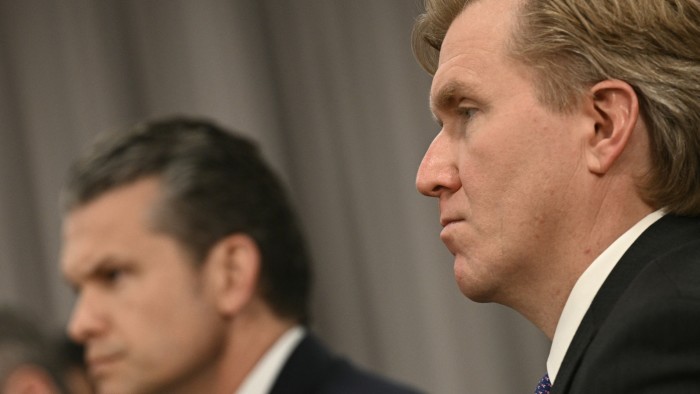Unlock the White House Watch newsletter for free
Your guide to what Trump’s second term means for Washington, business and the world
The Pentagon is pressing Japan and Australia to make clear what role they would play if the US and China went to war over Taiwan, in an effort that has frustrated the two most important American allies in the Indo-Pacific.
Elbridge Colby, under-secretary of defence for policy, has been pushing the issue in meetings with Japanese and Australian defence officials in recent months, said five people familiar with the discussions.
The push is his latest effort to convince US allies in the Indo-Pacific to enhance deterrence and prepare for a potential war over Taiwan.
A US defence official declined to comment about the request related to Taiwan, but stressed the “animating theme” of Colby’s discussions with allies was “to intensify and accelerate efforts to strengthen deterrence in a balanced, equitable way”.
Those talks include efforts to persuade allies to raise defence spending amid rising concern about China’s threat to Taiwan. But the request for commitments related to a war over the island is a new demand from the US.
“Concrete operational planning and exercises that have direct application to a Taiwan contingency are moving forward with Japan and Australia,” said one person. “But this request caught Tokyo and Canberra by surprise because the US itself does not give a blank cheque guarantee to Taiwan.”
The US has long had a policy of “strategic ambiguity” under which it does not say if it would defend the island. Former president Joe Biden on four occasions deviated from that, saying the US would intervene. But Donald Trump has echoed other presidents in refusing to say what he would do.
Zack Cooper, an Asia expert at the American Enterprise Institute, said: “It is very difficult to get allies to provide specifics about what they would do in a Taiwan conflict when they don’t know either the scenario’s context or America’s own response.”
“President Trump has not committed to defend Taiwan, so it is unrealistic for the US to insist on clear commitments from others.”
The push has been aimed at Japanese and Australian defence officials, and not higher levels. A second person said there was a “collective raising of eyebrows” from representatives in Japan, Australia and other US allies.
Japan’s defence ministry said it was “difficult to answer the hypothetical question of a ‘Taiwan emergency’.” It said any response would “be implemented on an individual and specific basis in accordance with the constitution, international law, and domestic laws and regulations”.
The Australian embassy in the US did not comment.
Colby’s push follows other actions that have sparked anxiety. The Financial Times last month reported he was reviewing the Aukus security deal that will enable Canberra to procure nuclear-powered submarines.
Colby has also urged European militaries to reduce their focus on the Indo-Pacific and focus more on the Euro-Atlantic region. The FT also reported recently that Japan cancelled a high-profile ministerial meeting with the US after Colby abruptly increased the US request for more defence spending.
The Pentagon was forced to defend Colby in recent days after reports he was responsible for the decision to block weapons for Ukraine, which was shortly afterwards overturned by the president.
But the debate about Taiwan planning comes as Tokyo and Canberra feel pressure from Trump to boost spending, which allies of Colby say is very important given the rising threat from China in the Indo-Pacific region.
“We are coming to our allies in the Indo-Pacific, very similar to what the president did in Europe, and saying this is the threat environment,” said the US official. “Obviously, some of these are tough conversations, including on defence spending. But we think it will leave us all in a better place.”
The official said the administration was confident that Japan and Australia would boost defence spending more quickly than European allies had.
“We don’t think it should — nor can it — take 20 years. Not just because it is in our interests, but because it is so much in the Indo-Pacific allies’ interests as well.”
The situation is particularly sensitive for Japan because the push for more spending — including one from Colby that was publicly rebuked by Prime Minister Shigeru Ishiba — comes ahead of upper house elections on July 20.
The official said the US understood that it had to be sensitive to the political considerations of allies.
“That is something we all have to work through,” the official said. “It’s tough, but things simply must become fairer and more equitable for this to work — which it must. That is why we have leadership.”
The official said the Pentagon had received “positive” indicators on higher spending from Japan and Australia, but stressed that it was “critical for us all that we see results”.
Some allies believe Colby is ignoring their concerns in his pursuit for stronger deterrence. The official said that was “demonstrably untrue”.
“We are investing tremendous amounts of time and energy to work with allies to find ways to address our shared challenges in ways that leave us both better off,” he said.
Additional reporting by Leo Lewis in Tokyo



